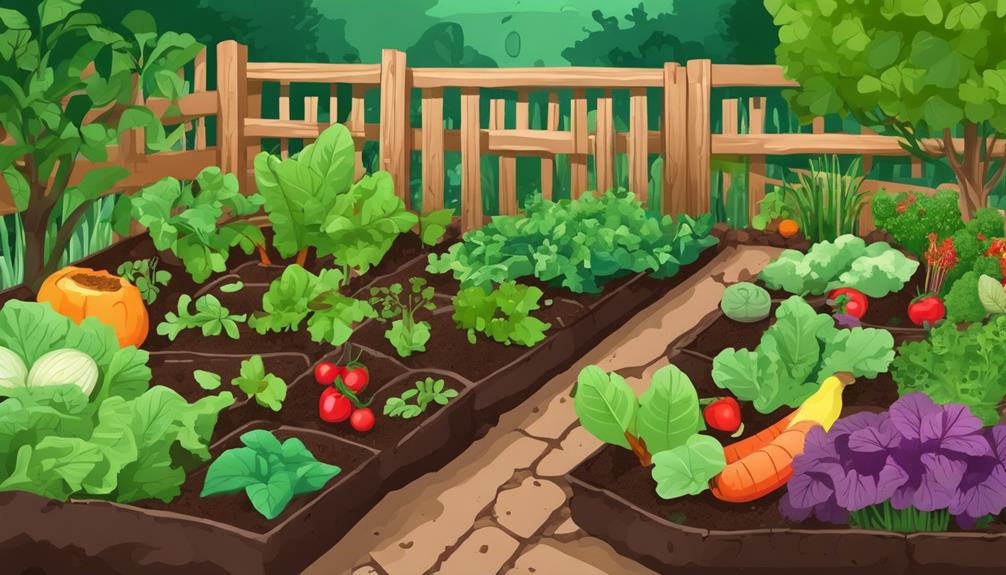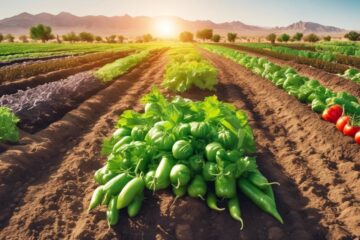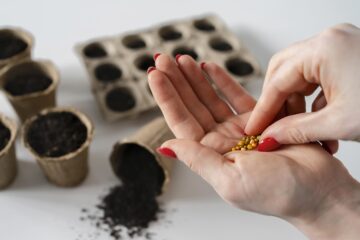When it comes to nourishing your vegetable garden, the choice of the best homemade fertilizer can make all the difference in the health and yield of your plants.
While kitchen scraps and organic materials can be beneficial, have you considered the lesser-known options that might surprise you with their effectiveness?
From unconventional tea blends to innovative nutrient-rich solutions, exploring a variety of homemade fertilizers could unveil a secret formula that revolutionizes your veggie-growing game.
Rice Water
Make your veggies thrive with nutrient-rich rice water, a natural homemade fertilizer packed with vitamins and minerals. This sustainable solution not only enhances soil fertility but also acts as a root stimulant for your vegetable plants.
The vitamins, minerals, and amino acids present in rice water provide a wholesome boost to support healthy vegetable growth. By utilizing the starch and carbohydrates in rice water, you can encourage robust root development in your plants, leading to overall improved health and productivity.
This homemade fertilizer is cost-effective and easy to prepare—simply save the water used to rinse or soak rice before cooking. Embrace the power of rice water to nourish your veggies organically and effectively.
Compost Tea
Enhance your vegetable garden's fertility and promote plant vitality with nutrient-rich compost tea. Compost tea is a liquid fertilizer that contains beneficial microbes, essential nutrients, and organic matter crucial for plant growth. Here's why you should consider using compost tea in your garden:
- Improves Soil Structure: Compost tea helps enhance soil structure, making it easier for plants to establish strong root systems.
- Increases Nutrient Availability: The nutrients present in compost tea become readily available to plants, supporting healthy growth and development.
- Enhances Plant Vitality: Regular application of compost tea can boost plant health, leading to increased yields and overall garden sustainability.
- Environmentally Friendly: This homemade fertilizer is cost-effective, easy to make, and promotes eco-friendly gardening practices.
Liquid Seaweed
Consider adding liquid seaweed to your gardening routine for a natural boost of essential nutrients and trace elements.
Liquid seaweed fertilizer is rich in potassium and trace elements crucial for plant growth. It helps enhance soil structure, improve nutrient absorption, and boost plant immunity.
This organic fertilizer can be used as a foliar spray or soil drench, delivering readily available nutrients to promote healthy plant growth and increase yields.
Liquid seaweed is eco-friendly, sustainable, and supports the overall health of both plants and the soil ecosystem.
Worm Tea
Produced from worm castings and compost, worm tea is a nutrient-rich liquid fertilizer that provides essential plant nutrients and beneficial microorganisms for your vegetable garden. Here are some key benefits of using worm tea in your garden:
- Nutrient-Rich: Worm tea contains vital nutrients like nitrogen, phosphorus, and potassium for your plants' health.
- Soil Structure: It enhances soil structure, improving water retention and aeration for healthy root growth.
- Disease Resistance: The beneficial microorganisms in worm tea help plants resist diseases naturally.
- Home-Made: This organic liquid fertilizer is easy to make at home, providing a cost-effective solution for your vegetable garden's needs.
Incorporating worm tea into your gardening routine can lead to thriving plants and a bountiful harvest.
Weed Tea
Weed tea, a nutrient-rich homemade fertilizer, is created by steeping common weeds in water. This organic alternative is packed with essential nutrients like nitrogen, potassium, and phosphorus, which are vital for promoting healthy plant growth. By using weed tea, you are not only nourishing your vegetables but also practicing sustainable gardening by recycling nutrients from weeds back into the soil. This eco-friendly approach supports plant health while reducing waste. Check out the table below for a quick overview of the benefits of using weed tea as a fertilizer:
| Nutrient-Rich Weed Tea Benefits | |
|---|---|
| Nitrogen | ✓ |
| Potassium | ✓ |
| Phosphorus | ✓ |
Frequently Asked Questions
What Is the Best Homemade Fertilizer for Vegetables?
For your veggies, consider compost tea, liquid seaweed, worm tea, manure tea, or wood ash. Each offers unique benefits like essential nutrients, potassium, beneficial microbes, and nitrogen, enhancing growth and health in your vegetable plants.
How Do You Make the Best Fertilizer at Home?
To make the best fertilizer at home, gather kitchen waste water, organic plant materials, and mineral-rich substances. Utilize liquid fertilizers for easy application. Consider animal-based options for healthy soil. Mix and match to provide essential nutrients for robust vegetable growth.
What Is the Best Fertilizer for a Vegetable Garden?
You want the best fertilizer for your vegetable garden. Compost tea, liquid seaweed, worm tea, manure tea, and wood ash are fantastic choices. Each provides essential nutrients for healthy plant growth. Give them a try!
What Is the Best Homemade Fertilizer for Tomatoes?
For your tomatoes, focus on a balanced homemade fertilizer high in potassium. Comfrey tea is great for growth. Eggshell water prevents rot. Liquid seaweed fertilizer boosts micronutrients. Avoid high nitrogen types. Your tomatoes will thrive with these choices.
Conclusion
So there you have it, a variety of homemade fertilizers to help your veggies thrive.
Did you know that using organic fertilizers can increase soil biodiversity by up to 33%?
By incorporating these natural options into your gardening routine, you not only provide essential nutrients for your plants but also support a healthier ecosystem in your garden.
Happy gardening!





